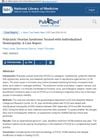
Search
for
Sort by
Research
60-90 / 1000+ results

research Hirsutism
Hirsutism is too much hair growth in women like the pattern in men, often caused by high male hormones, and can be treated with hormone control and hair removal methods.

research Genetics of Polycystic Ovary Syndrome
PCOS has a strong genetic basis, but more research is needed to fully understand it.

research Treatment of Hirsutism with the Pure Antiandrogen Flutamide
Flutamide effectively reduced excessive hair growth and improved related symptoms in hirsutism patients without significant side effects.

research Role of Anticonvulsant and Antiepileptogenic Neurosteroids in the Pathophysiology and Treatment of Epilepsy
Neurosteroids show promise for treating epilepsy and more research is needed.

research Relationship of the Metabolic Syndrome and Obesity to Polycystic Ovary Syndrome: A Controlled, Population-Based Study
Metabolic syndrome and PCOS are related but separate conditions, with metabolic syndrome increasing the risk of heart disease and diabetes.

research Treatment of Hirsutism by Finasteride and Flutamide in Women with Polycystic Ovary Syndrome
Finasteride and flutamide effectively reduce hirsutism in PCOS women, with flutamide also lowering hormone levels.

research A Pilot Study on the Sexual Side Effects of Finasteride as Related to Hand Preference for Men Undergoing Treatment of Male Pattern Baldness
Left-handed men experience more sexual side effects from finasteride treatment.
research Relating Neurosteroid Modulation of Inhibitory Neurotransmission to Behavior
Neurosteroids can influence behavior by modulating brain inhibition, with potential for treating psychiatric disorders.

research Reply to 'Frontal Fibrosing Alopecia'
Smoking doesn't cause or prevent Frontal Fibrosing Alopecia, hormonal imbalance may be involved, and a combination of antiandrogens and steroids can help stabilize the condition.
research Development and Evaluation of Novel Rodent Model of PCOS Mimicking Clinical Phenotype in Human Disease
The new rodent model successfully mimics non-lean human PCOS symptoms.
research Neurosteroid-Sensitive δ-GABAA Receptors: A Role in Epileptogenesis?
Blocking neurosteroid production can lead to more seizures and faster epilepsy onset in rats.
research Alleviation of Mechanical Allodynia by 14,15-Epoxyeicosatrienoic Acid in a Central Poststroke Pain Model: Possible Role of Allopregnanolone and Delta-Subunit-Containing Gamma-Aminobutyric Acid A Receptors
14,15-EET may help reduce poststroke pain by affecting certain brain proteins.
research Catamenial-Like Seizure Exacerbation in Mice with Targeted Ablation of Extrasynaptic δGABA-A Receptors in the Brain
Removing certain brain receptors in mice worsens seizure severity and response to treatment during hormone withdrawal.
research The Current and Emerging Role of Statins in the Treatment of Polycystic Ovary Syndrome: The Evidence to Date
Statins may help treat PCOS by lowering androgen levels and improving cholesterol.

research Lifestyle Changes and Nutrition in Polycystic Ovarian Disorder: A Holistic Review
Lifestyle changes like a healthy diet, exercise, and proper sleep can help manage PCOD.

research Correlation of Skin Changes With Hormonal Changes in Polycystic Ovarian Syndrome: A Cross-Sectional Clinical Study
Skin changes in women with PCOS are mainly due to hormonal imbalances.

research Effect of Lifestyle Modifications on Reproductive Function Among Infertile Obese Women with Polycystic Ovarian Syndrome
Lifestyle changes improve reproductive function and hormonal balance in obese women with PCOS.
research Knowledge About Polycystic Ovarian Syndrome and Effect of Lifestyle Habits Among Medical Students of North India
Most medical students in North India know about PCOS and how lifestyle changes can affect it; early screening is important to prevent complications.

research A Prospective Observational Study on Evaluation of Complications in Women with Polycystic Ovarian Syndrome
Lifestyle changes and medication can improve the quality of life for women with PCOS by reducing complications.

research Polycystic Ovarian Disease: Current Insights and Therapeutic Strategies
Combining lifestyle changes and medication is most effective for managing PCOS symptoms.

research Interventional Studies for Polycystic Ovarian Syndrome in Children and Adolescents
Early treatment and lifestyle changes are important for managing PCOS in young people to prevent long-term health issues.

research Management of Polycystic Ovarian Syndrome: Looking Beyond the Ovaries
PCOS treatment focuses on lifestyle changes and specific medications to manage symptoms and complications.

research Ovarian Hilus Cell Hyperplasia and Sertoli-Leydig Cell Tumor in a Patient with Postmenopausal Virilization: A Rare Case Report
A woman's male-like physical changes were caused by two rare ovarian conditions.

research Polycystic Ovarian Syndrome: Comprehensive Overview and Management Approaches
Eating 500 fewer calories a day and making lifestyle changes can improve PCOS symptoms and reduce diabetes risk; more research is needed on its causes and treatments.

research Comparative Management Methods for Adolescents With Polycystic Ovarian Syndrome: A Systematic Review
Individualized treatment plans, including lifestyle changes and specific medications, are crucial for managing PCOS in adolescents.
research A Review of Polycystic Ovarian Syndrome in Ayurveda
Ayurveda treats PCOS by balancing body elements and using lifestyle changes and herbs.

research Polycystic Ovarian Syndrome (PCOS)
PCOS is a hormonal disorder in women with no cure, managed by medication and lifestyle changes.

research Polycystic Ovarian Syndrome Revisited
PCOS is a complex condition that affects women's hormonal balance and metabolism, requiring lifestyle changes and medical management.

research Polycystic Ovarian Syndrome Treated With Individualized Homeopathy: A Case Report
Personalized homeopathy medicine, along with lifestyle changes, can effectively treat Polycystic Ovarian Syndrome.